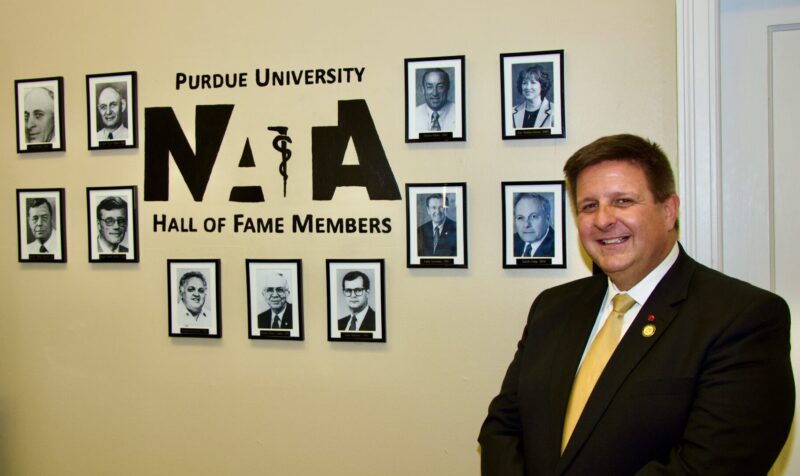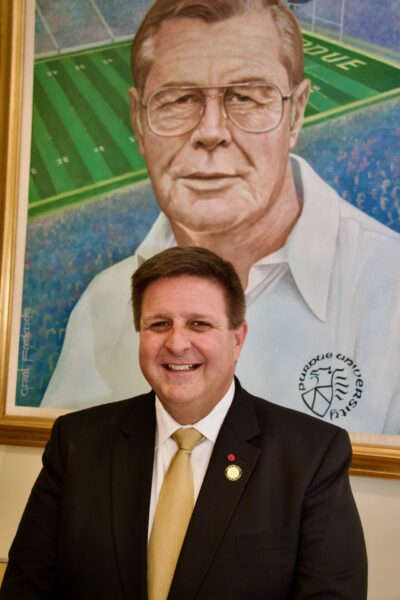Voll to become Purdue Athletic Training’s 12th inductee into the National Athletic Trainers’ Association Hall of Fame

Craig Voll, clinical assistant professor and Purdue University Sports Medicine Concentration coordinator, will become the 12th Purdue member of the National Athletic Trainers’ Association Hall of Fame on June 26. Here, he stands in front of portraits of Purdue’s previous 11 inductees.Tim Brouk
Written by: Tim Brouk, tbrouk@purdue.edu
Craig Voll broke into the field of sports medicine and athletic training thanks to a scholarship that bore the curious name of William E. “Pinky” Newell. He quickly learned Pinky was essentially the architect of modern sports medicine during his tenure as an athletic trainer and instructor from 1949-76 at Purdue University.
Decades later, Voll, now the coordinator for the sports medicine concentration in the Purdue Department of Health and Kinesiology’s (HK) kinesiology major, walks the same Lambert Fieldhouse halls Newell once did. On June 26 in New Orleans, Voll will join Newell in the National Athletic Trainers’ Association (NATA) Hall of Fame. Voll will be the 12th Boilermaker to be named a NATA Hall of Famer.
“People asked me, ‘Who was the one person that had the most impact on your career?’ And I said ‘The one person is someone I actually never met. It was Pinky,’” he said. “I get my first job at Purdue, and there are pictures of Pinky everywhere. It’s almost like the cartoon ‘Scooby-Doo’ where the eyes of paintings follow you no matter where you are in the room. I was motivated to not let Pinky down.”
Finishing his first year back at Purdue, Voll has already made an impact on students and the program. Part of that impact stems from Voll’s expertise and foundational lessons he learned during his first hitch in West Lafayette: He served as an athletic trainer for Purdue Coach Joe Tiller’s many successful football squads from 1999 into the 2000s. He worked with future NFL star offensive linemen Matt Light and Gene Mruczkowski and expected first ballot Hall of Fame quarterback Drew Brees.
But then Voll called an audible — teaching became his preferred position. The athletic trainer turned educator earned his PhD from HK in 2015. He worked as a lecturer as well.
“My experiences up until this point, I’ve become the best version of myself over my career: I’ve got high school athletic training experience; I’ve got collegiate athletic training experience; I’ve got professional athletic training experience; I’ve got hospital system and healthcare administration experiences,” Voll said. “I can take all of those experiences when I’m teaching in the classroom and bring examples into the teaching to allow the students to make connections, to understand. This is what we’re teaching you, but this is how it really is out there.”
“The Drive,”“The Fumble,” the athletic trainer
A diehard — and often devastated — Cleveland Browns fan in the 1980s and ’90s, Voll’s career goal was to patrol the sidelines of a professional football field as an athletic trainer, ready to spring into action if a player aggravated an injury. Watching his Browns win — and come agonizingly close to championships — propelled him to pursue sports medicine.
After earning his undergraduate degree, Voll served three years as an athletic trainer for the Browns — as well as the team’s first year as the Baltimore Ravens when the Browns vacated Cleveland and changed team names in 1996. The move had Voll return to the Midwest for more degrees and his first stint at Purdue.
A different kind of opportunity brought Voll back to West Lafayette. As manager of sports medicine for Franciscan Health, he led an initiative to get athletic trainers into 34 rural Indiana high schools and middle schools. Voll oversaw 42 athletic trainers and three physicians. For some schools, these were the first athletic trainers they’d ever had.
“I firmly believe that the quality of health care that a student athlete got should not be dictated or determined by their zip code,” he said. “The type of services in our rural schools should be the same care regardless of where you went to school. And because of health care access, our athletic trainers were many times the only health care provider that these families and these students actually got to interact with on a regular basis. If you’re out in a rural area, that’s 45 minutes to a doctor’s office, so you tend not to seek that out. We were able to change that, the standard of care.”
NATA, NATA, NATA …

Voll stands in front of former Purdue athletic trainer Pinky Newell, who is credited as a “father” of modern athletic training. Voll called Newell a mentor he never met.Tim Brouk
One of Newell’s lessons Voll took to heart was volunteerism to promote the field of athletic training. Newell donated his time and expertise by serving in various leadership roles to grow NATA after its 1950 establishment. While it took Voll several applications and tries, he broke through and was elected as the NATA District IV director, president of the Great Lakes Athletic Trainers’ Association and Indiana Athletic Trainers’ Association, and a Division IV representative on the NATA State Association Advisory Committee. Currently, he serves as co-chair of the NATA Athletic Training Compensation Task Force and a member of the NATA Diversity, Equity, Inclusion and Access Task Force.
All Purdue HK full-time faculty members have been inducted into the Indiana Athletic Trainers’ Association Hall of Fame, but Voll will be Purdue’s first national Hall of Famer since David Craig in 2016. Voll’s mentor, Denny Miller, was inducted in 2001.
“I am happy to be one of the people who attracted Craig to Purdue,” said Miller, a former NATA president. “He was a young graduate with limited experience when hired but a person with boundless energy, excited about the latest technology and itching to be an athletic trainer in a Division I school. We were able to allow him to teach and mentor students as well, and he just blossomed.”
Sue Stanley-Green, a 1981 HK alumna and Purdue’s first graduate athletic training assistant, leads the NATA Hall of Fame selections as chair of the Honors and Awards Committee, and she is a 2004 NATA Hall of Fame honoree. While it’s been 20 years since her induction, Stanley-Green said Voll will never forget his days in New Orleans this month.
“Honestly, it is probably one of the best weeks of your life,” she added. “There’s so much reminiscing. It’s like, ‘How did I get here?’ That’s what’s really special about it because you know you didn’t do this by yourself. You have been part of a team; you’ve been part of groups; you’ve been part of the bigger picture of things, and that’s what’s so special. That’s what we all love about athletic training are the relationships. You start looking back at the relationships you’ve made and who has influenced your life.”
Voll admitted he is still in shock to be joining some of his Purdue mentors in the NATA Hall of Fame, including the mentor he never met in Newell.
“Humbled. Honored. Thankful. It’s recognition by your colleagues, but more importantly, it’s about the impact you’ve had,” Voll said. “This was my calling. This was my vocation.”
Discover more from News | College of Health and Human Sciences
Subscribe to get the latest posts sent to your email.